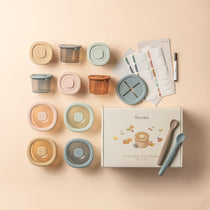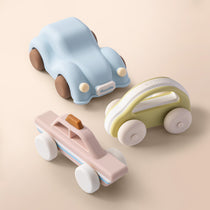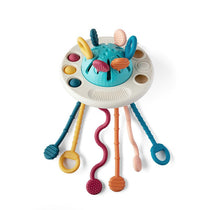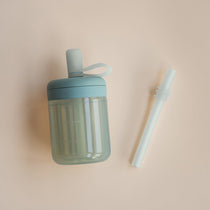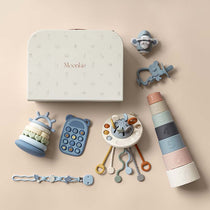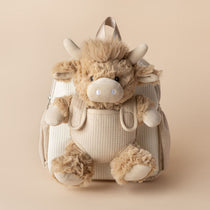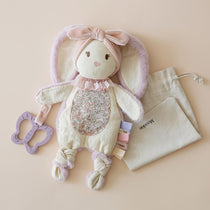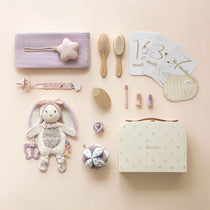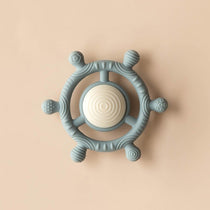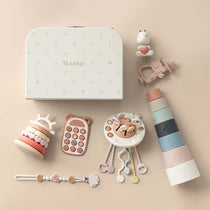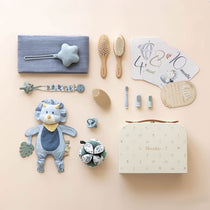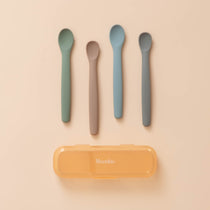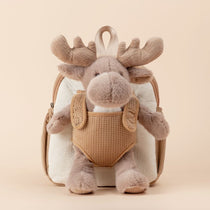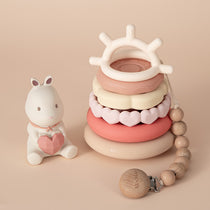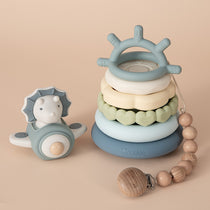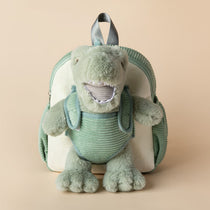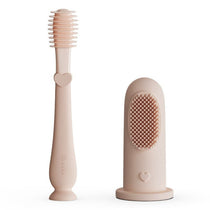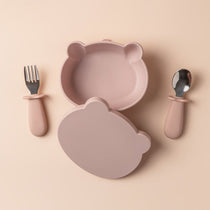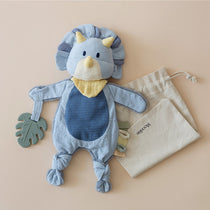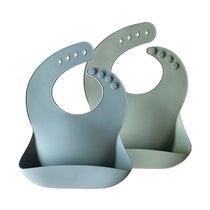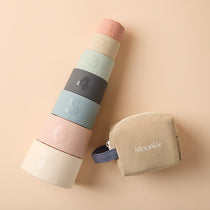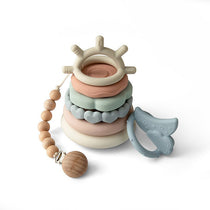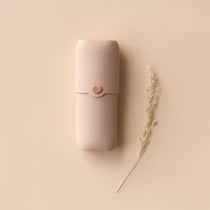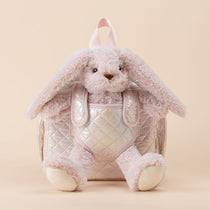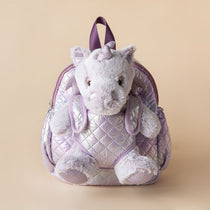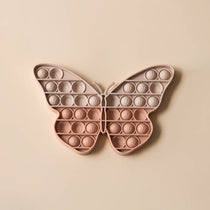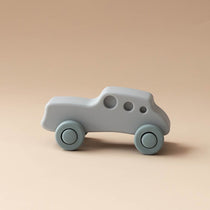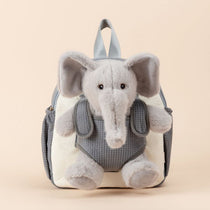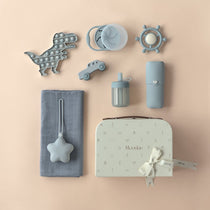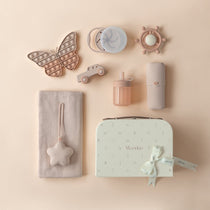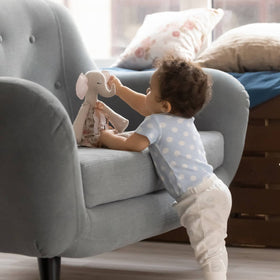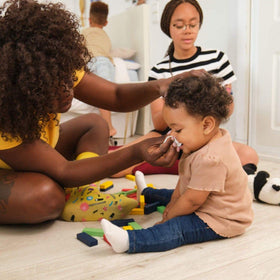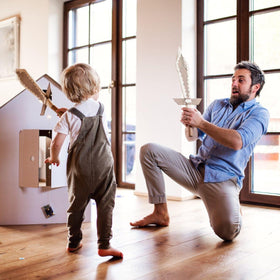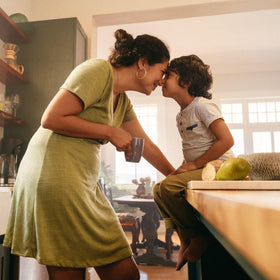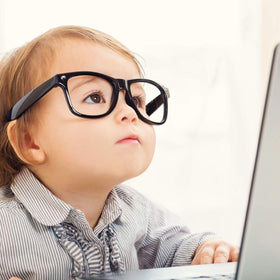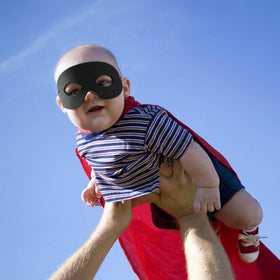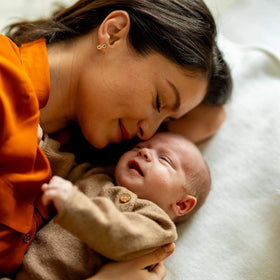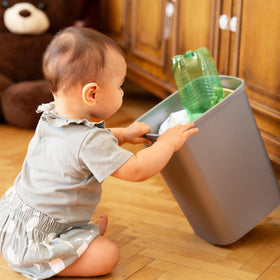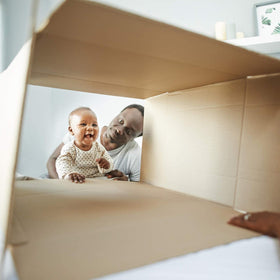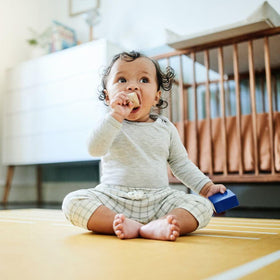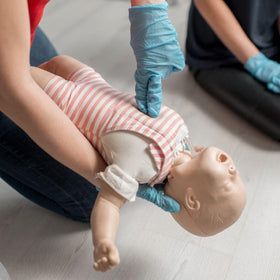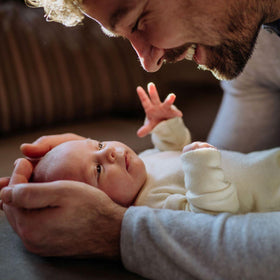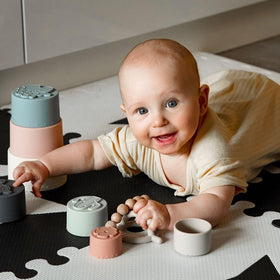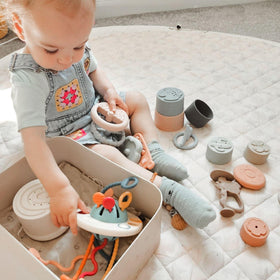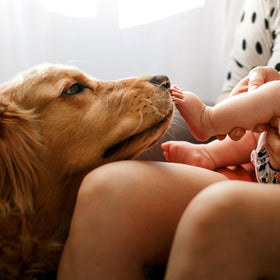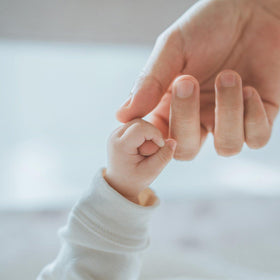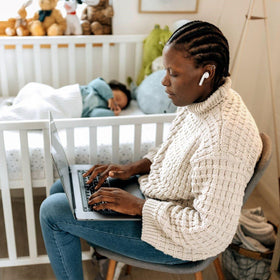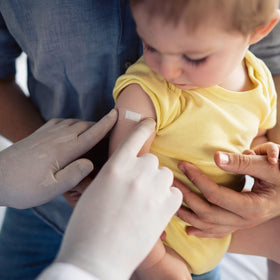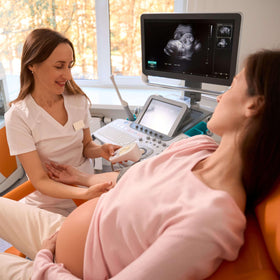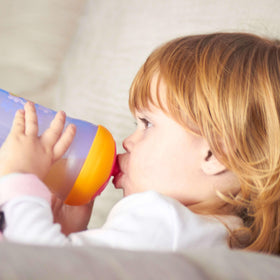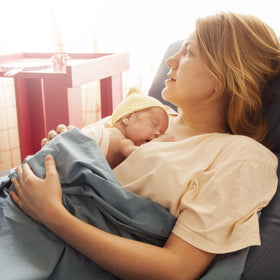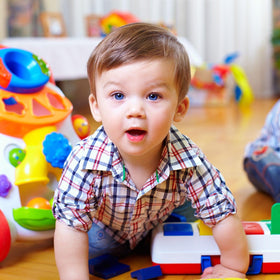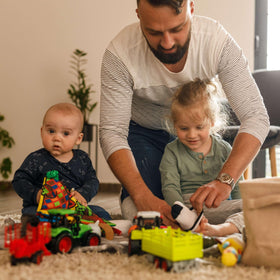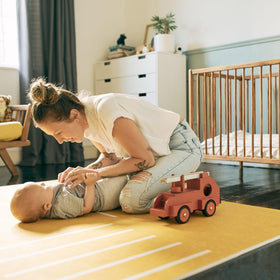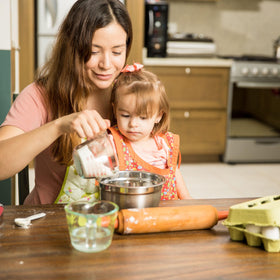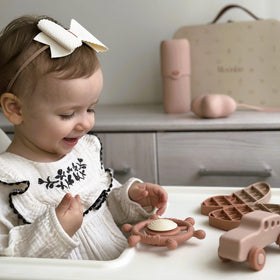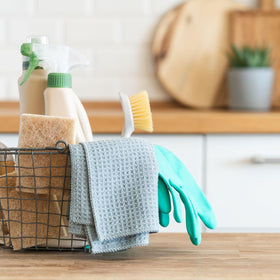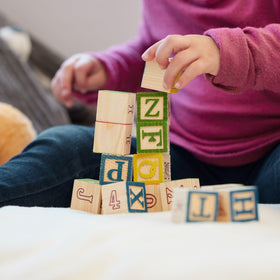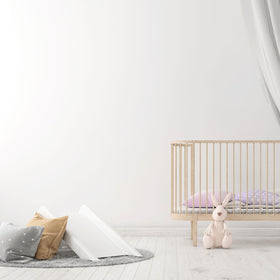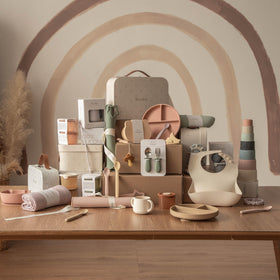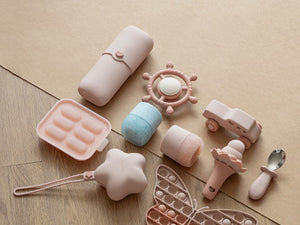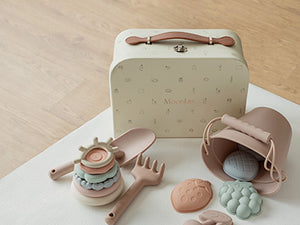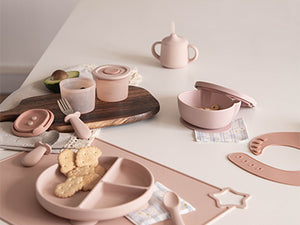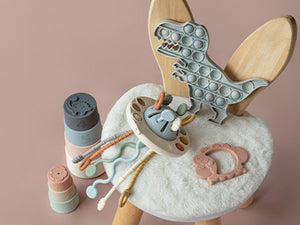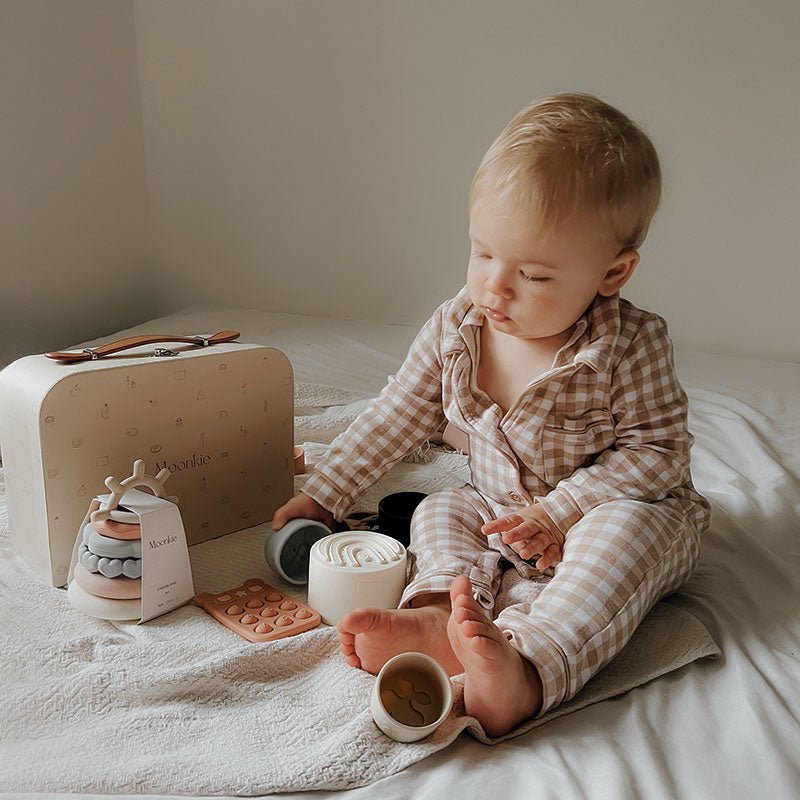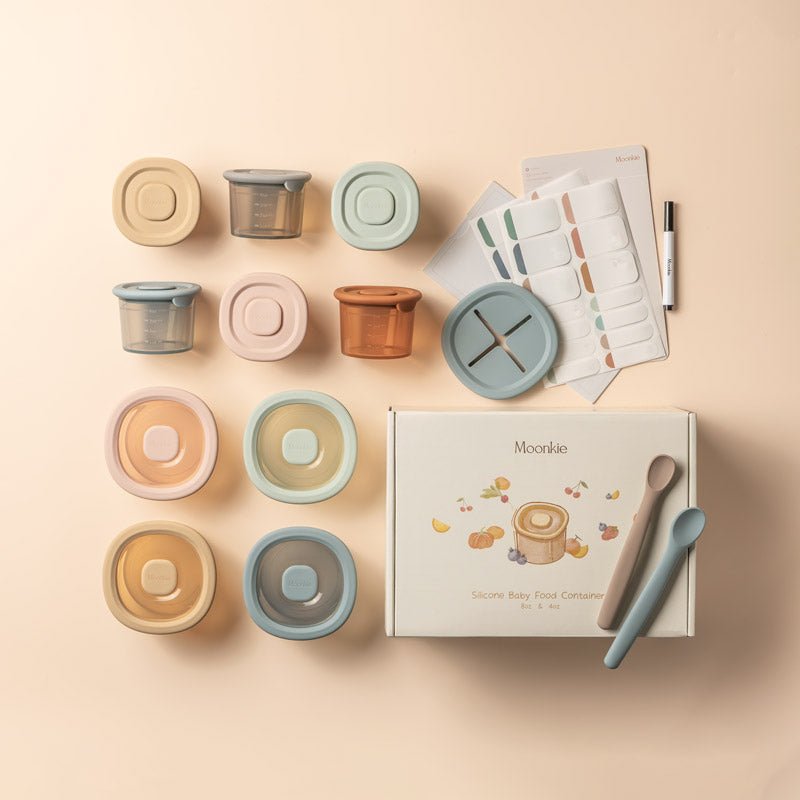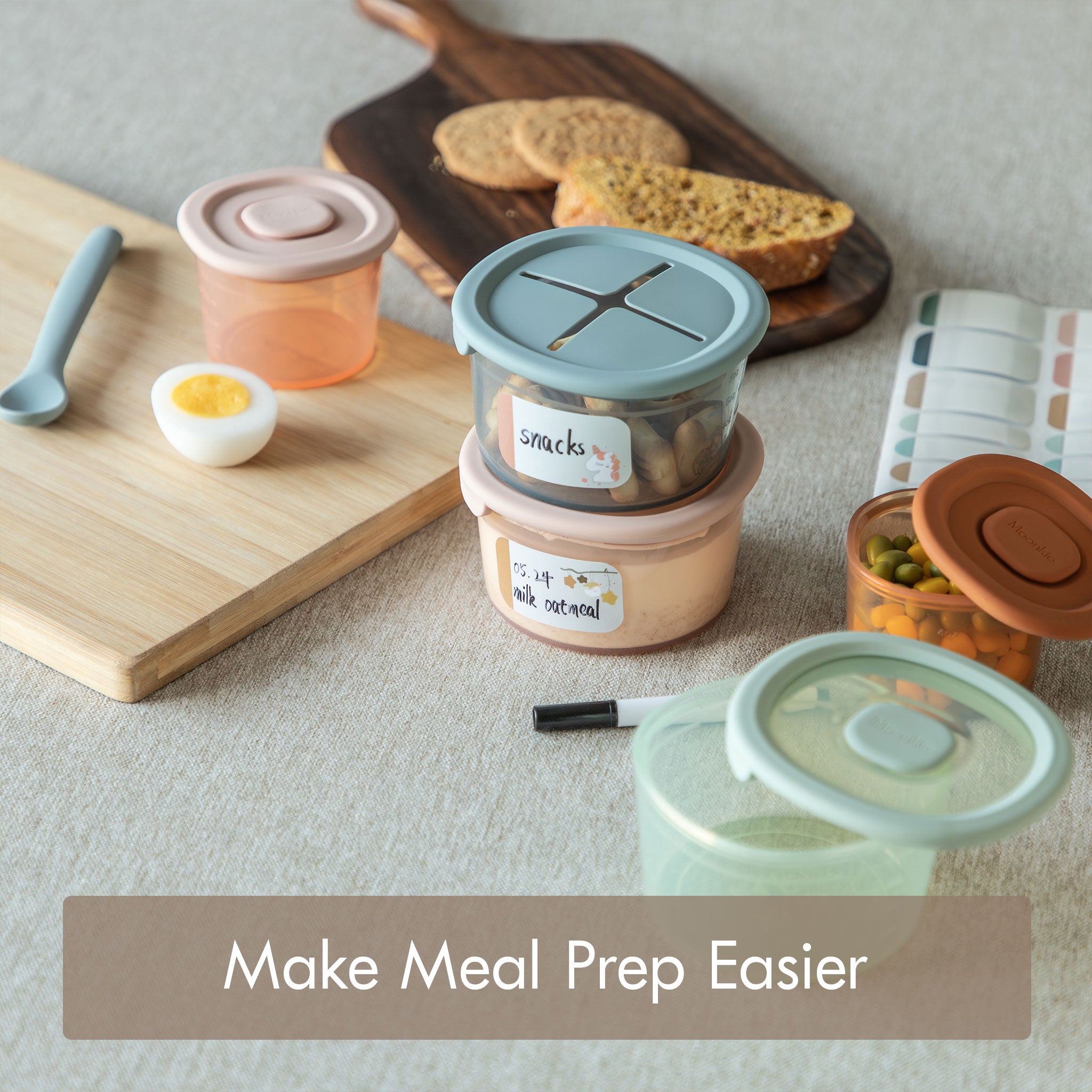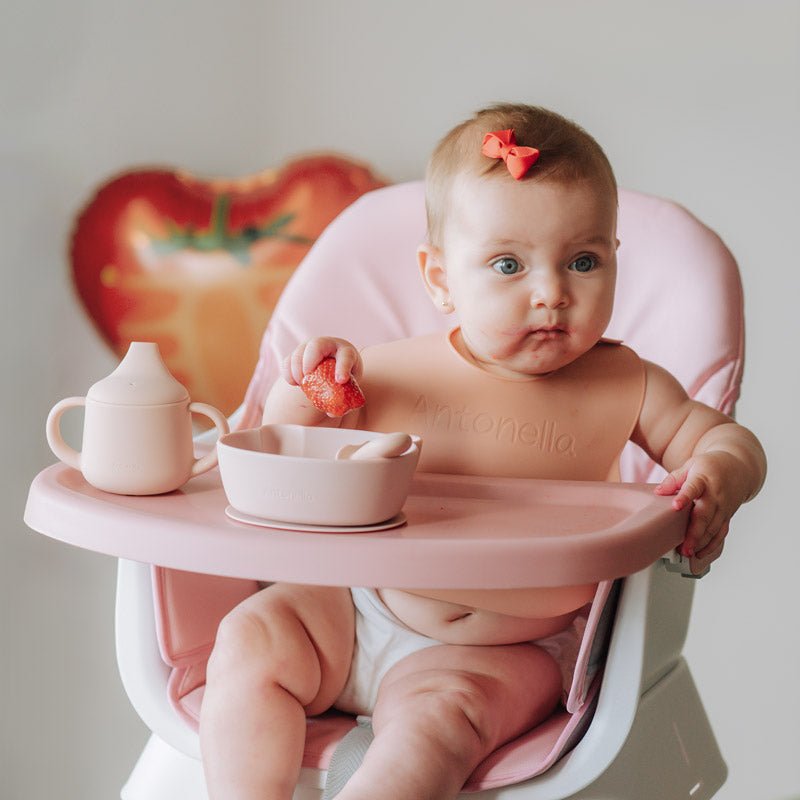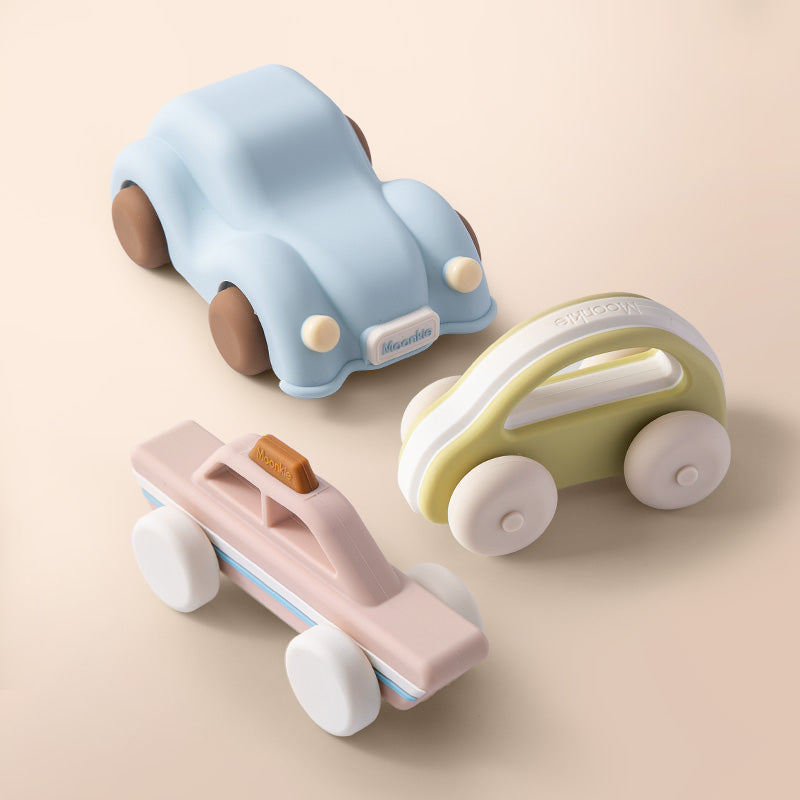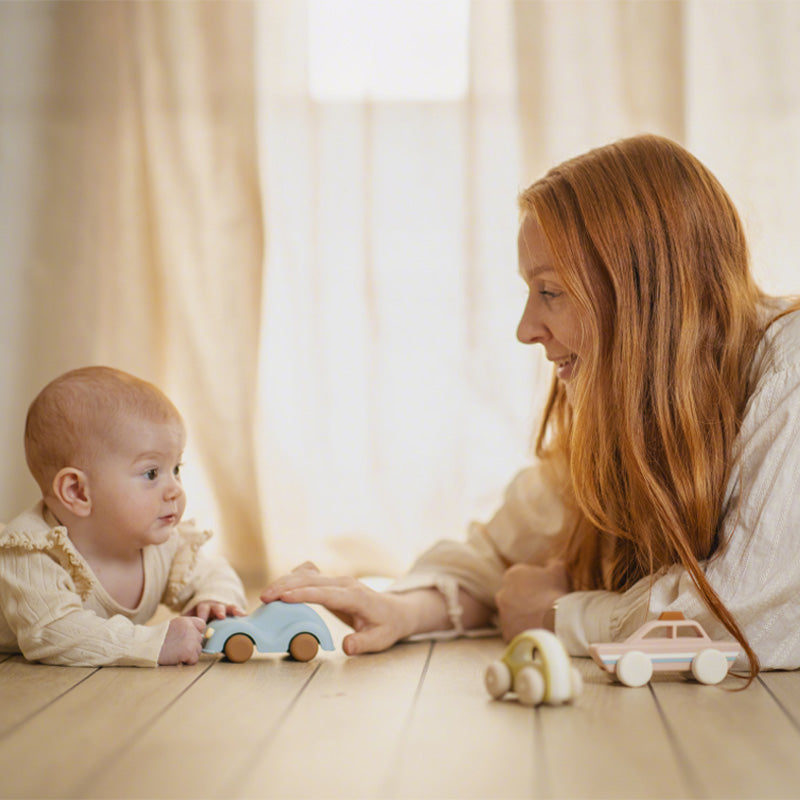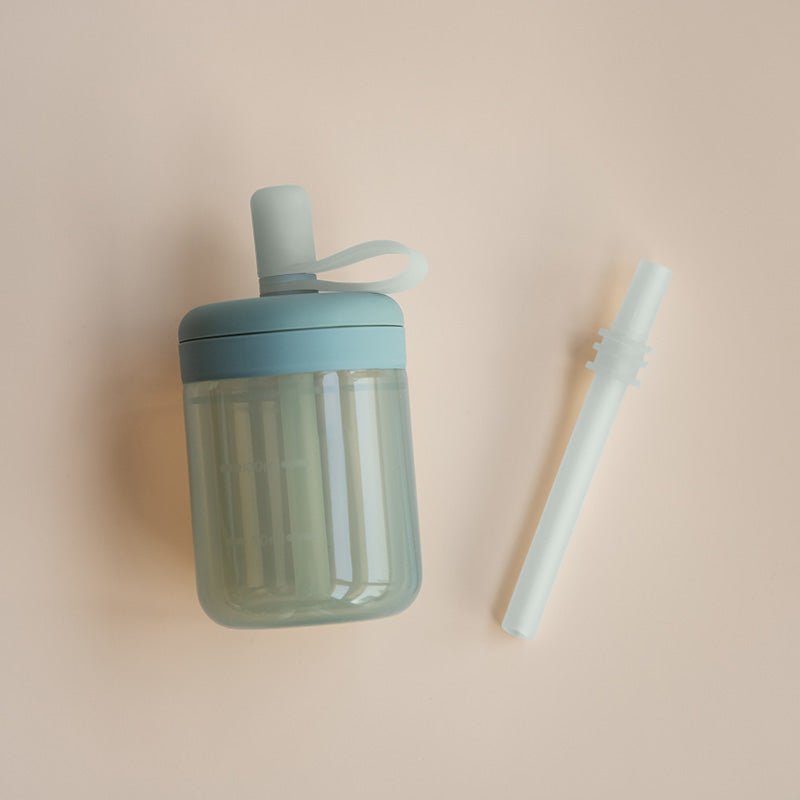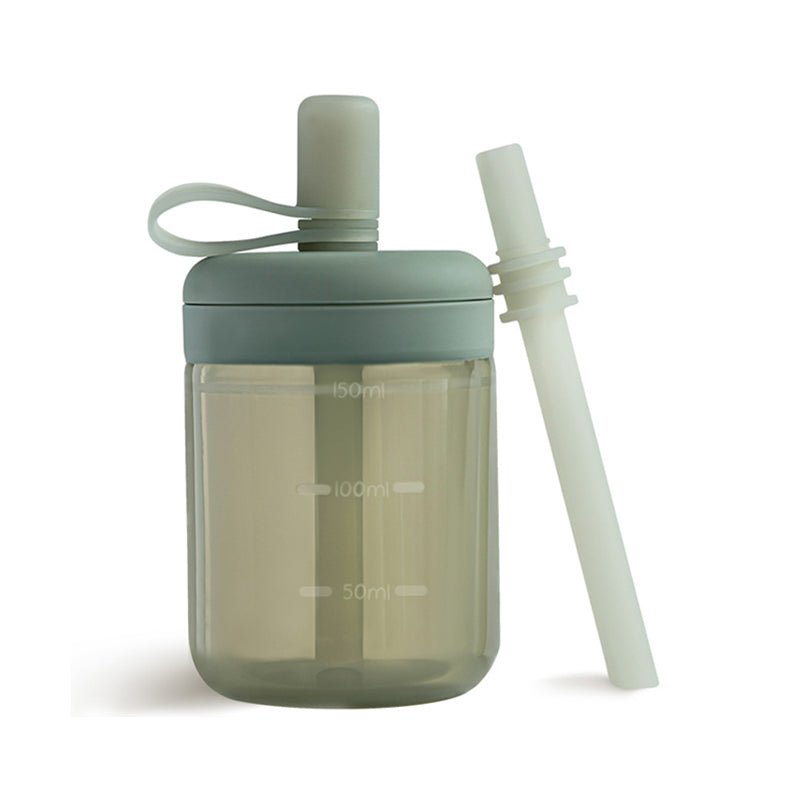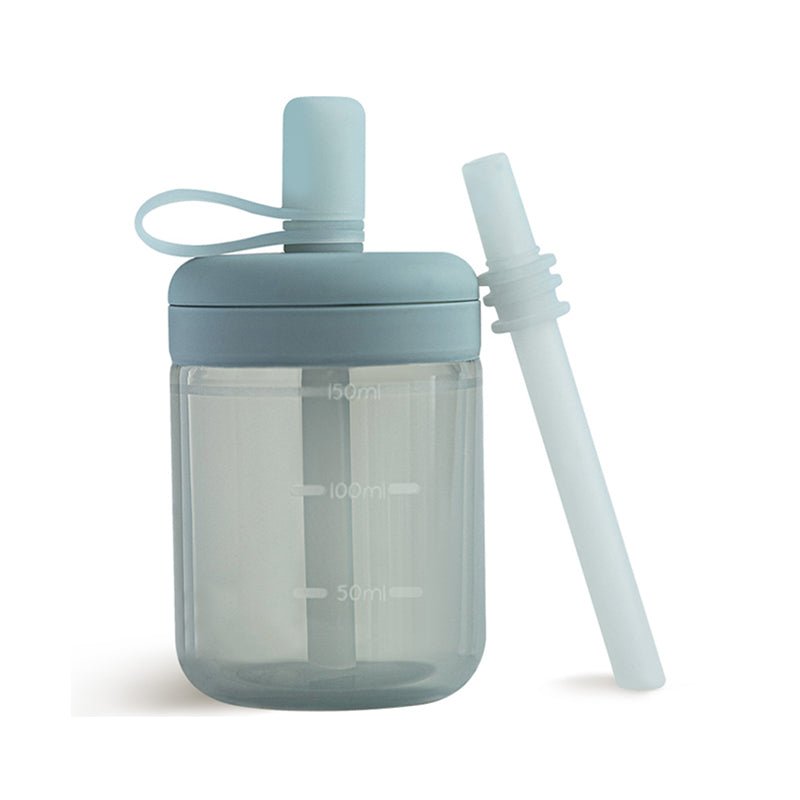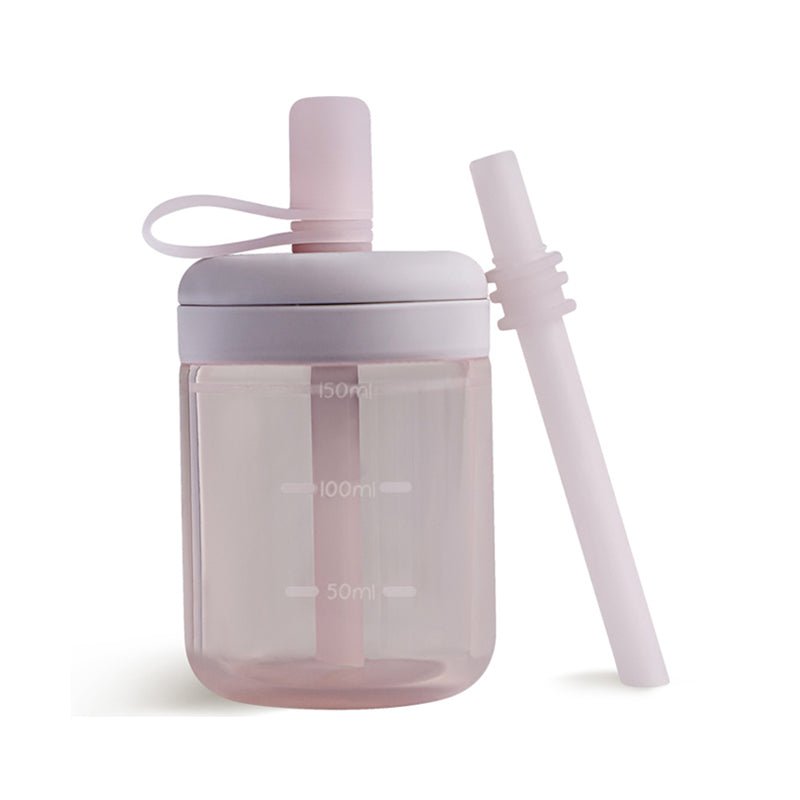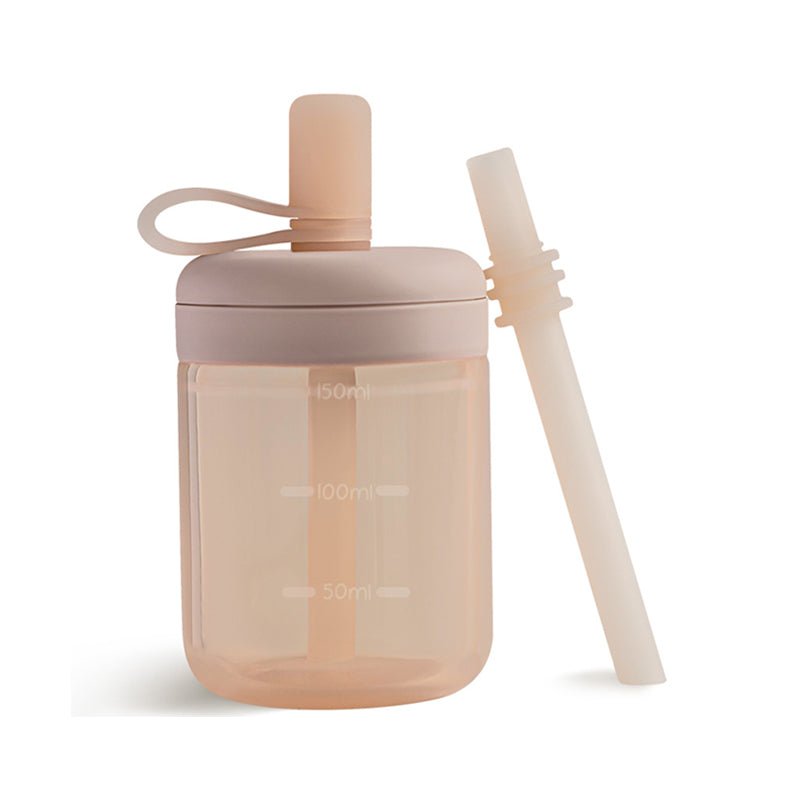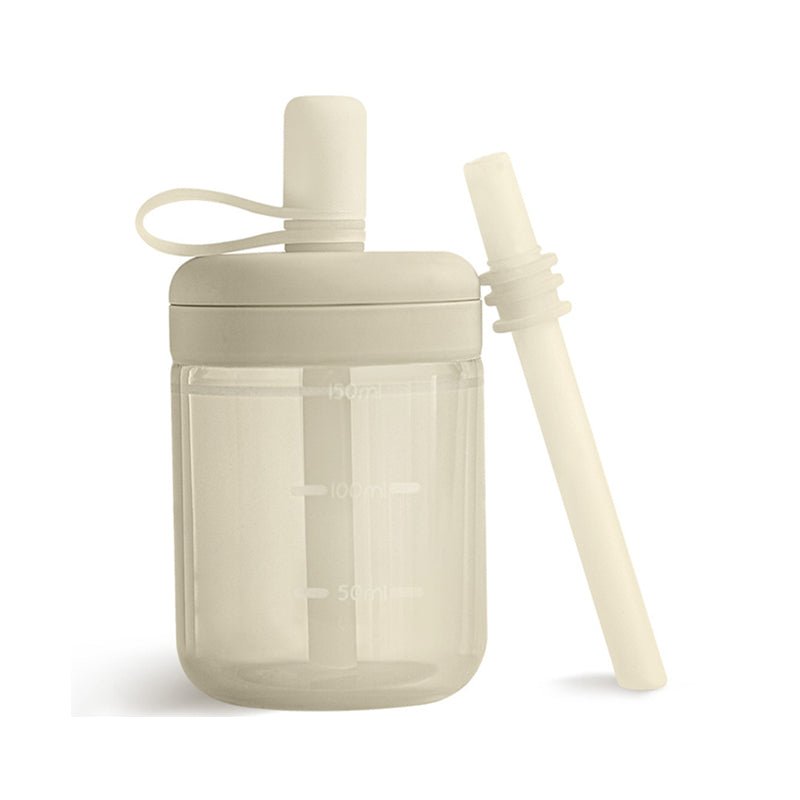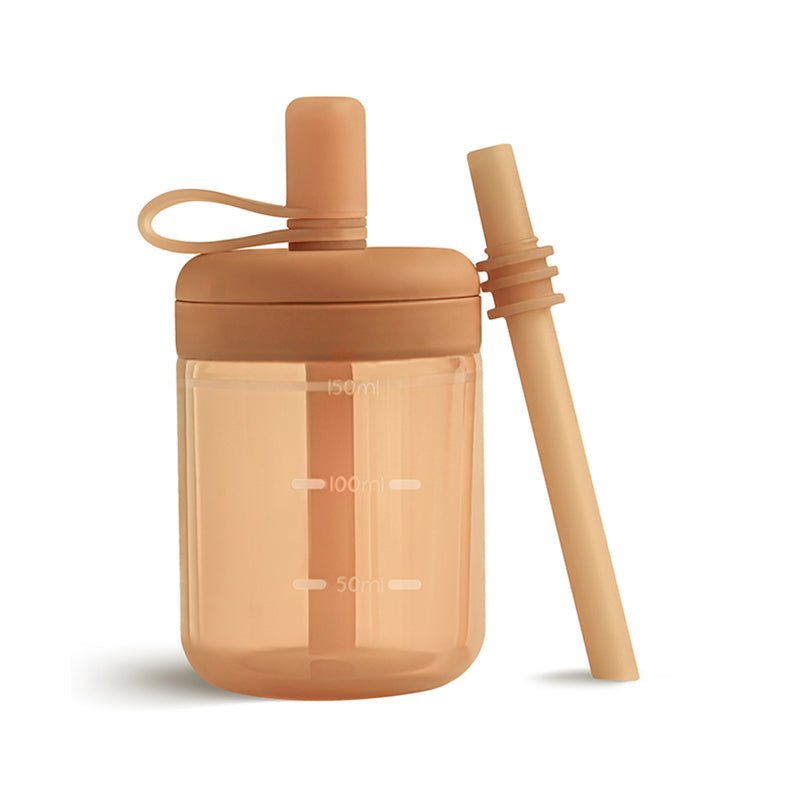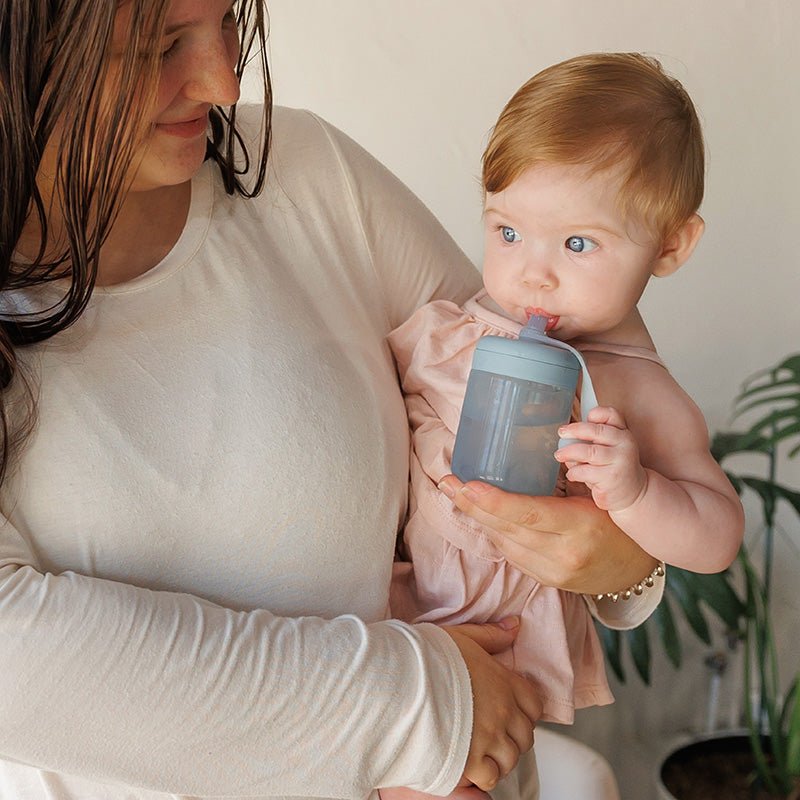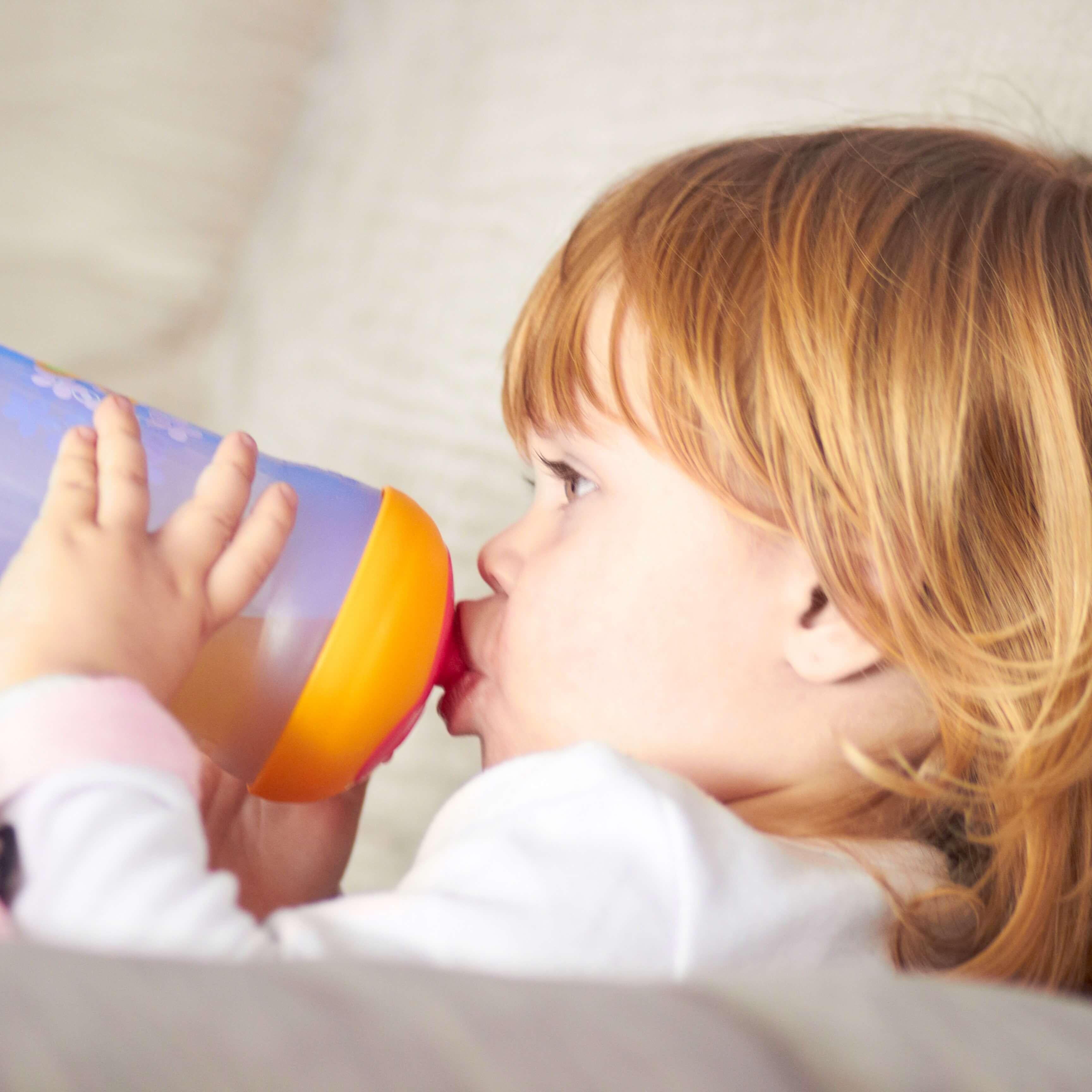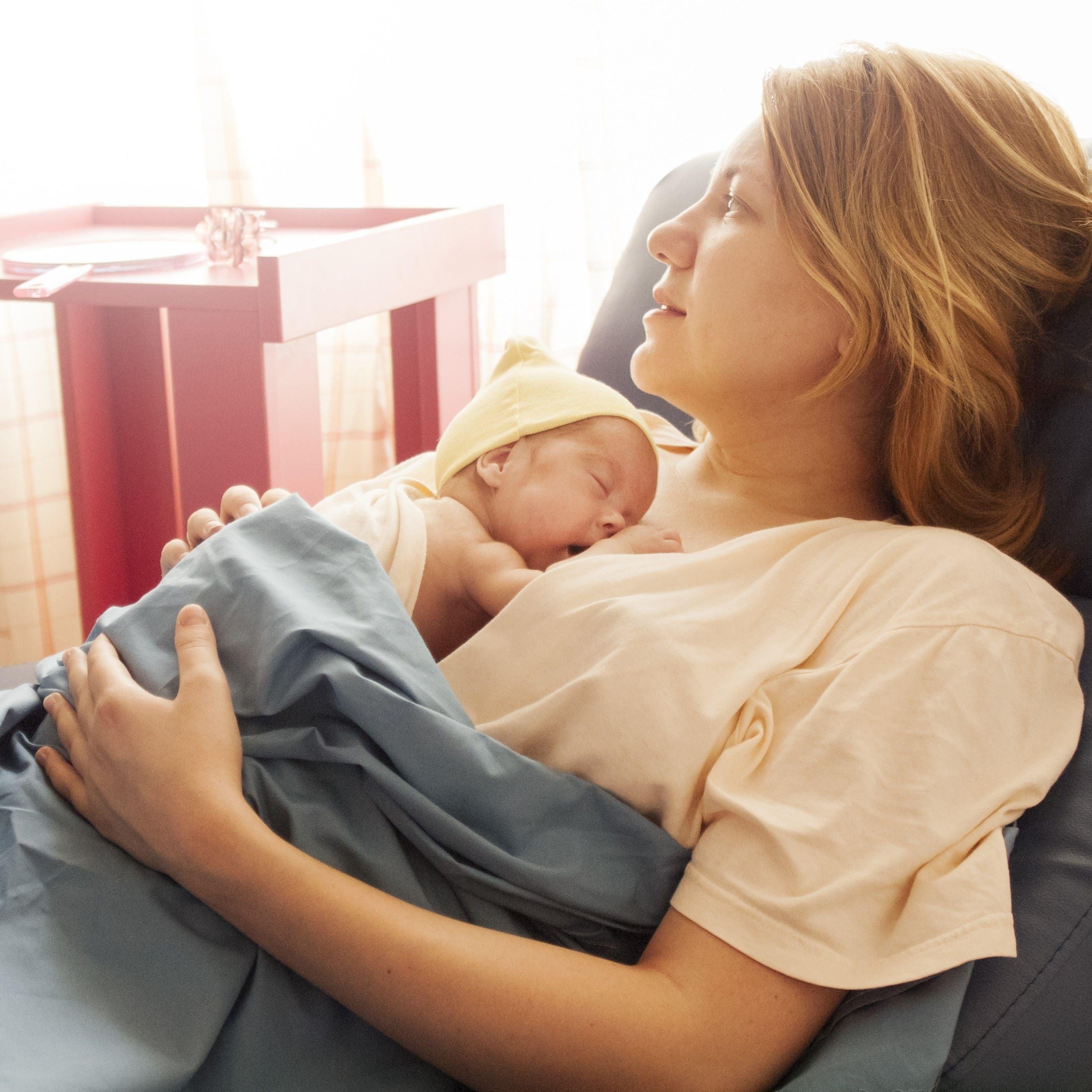As much as society would have us think so, "nesting" does not come naturally for all expecting mothers. There is always something we neglect or completely forget to do. So, having a core list of household baby preparation tasks is nifty!
Baby-proofing happens in stages: preparing for a newborn who doesn't go anywhere, a 6-month-old that sits up, a crawler and cruiser, and finally a walker. You'll likely have 9 to 12 months before your home needs to be "walking baby" ready, but your little one will make you nervous well before then.
Having been through the gauntlet of baby and early toddler stages multiple times, I know what preparation tasks tend to slip through the cracks. I've compiled an extensive list of what you need to prepare your home for your baby's first 6 months, as well as the crawling, cruising, and walking phases.
In This Article
25 Household Preparation Tasks to Complete Before Baby
The final weeks before giving birth are crucial to making the first weeks at home with your baby easier. Household preparation tasks include buying necessary items, deep cleaning, organizing, stocking up on food, settling documentation, and getting your pets vetted.
Some of these are obvious, but a few of them slip under the radar, especially for first-time parents or parents who are both working full-time.
1. Get Clothes, Burp Cloths, and Blankets
Whether you receive most of your baby's clothes, burp cloths, and blankets from friends and family or purchase them yourself, ensure you have plenty on hand.
Diaper blowouts, peeing everywhere, and spit-up streams are going to be a thing for a few months, so make sure you have more than a few outfits and burpcloths around.
Also, consider the weather in your area and how often you will want to dress up your baby. Around the house, you may not dress your little one in the cutest outfits, given how often you'll have to change those clothes.
Another thing to think about is sleepers. Will you use sleep sacks, footed onesies, or swaddles? This decision will ultimately come down to your baby's preferences, but having two to four different options will help you find what your little one sleeps in best.
Finally, pay attention to how each baby clothing item closes. I'll tell you from experience that snaps are awful. The last thing sleep-deprived newborn parents need when changing a screaming, wiggling newborn is a dozen snaps to match and close.
But for some reason, the most adorable outfits and sleepers have snaps! Beware!
2. Purchase a Crib or Pack 'n Play
Whether your baby will sleep in a crib or a pack 'n play needs to be decided before you go to the hospital, because you likely won't feel up to setting one up the day you bring your sweet bundle home.
Cribs are sturdy and cute, but they will only last until toddlerhood. Pack 'n plays often come with a raised bed or bassinet setting that you can use until your baby begins rolling over, which is fantastic when recovering from a cesarean delivery.
Pack 'n plays are also cheaper and more mobile than cribs, making them a popular option for parents on a budget or in a tight living space.
Quick Tip: If you purchase a pack 'n play, learn how to set it up and pack it down before your baby arrives. Doing so under pressure from a crying newborn and sleep deprivation is not a fun learning moment.
3. Set Up a Diaper Changing Station and Diaper Bag
A diaper changing station is a must! However, what you set a diaper changing station upon is not as complicated as some make it out to be. For instance, you do not need to purchase a changing table if you have a large, low dresser top.
I regularly changed one of my babies on a desk and another on a pad on my bed. I must warn you that astounding accidents do happen at times. A baby boy may pee everywhere when you open his diaper, or your baby may shoot poop an impressive six feet while you scramble to open a new package of diapers.
So, if you don't have much space and plan to change your baby on a changing pad on your bed or couch, lay a towel under the pad and off the end to make the "splash zone" that's easier to clean up.
Whatever place you choose as a changing station must be wide, long, and sturdy enough to hold your baby and diaper-changing essentials. Set up a small bucket, bin, or diaper caddy with fresh diapers, wipes, Aquaphor, diaper rash cream, and a hand towel.
You could even set up two or three of these around the house to ensure you are prepared for a blowout anywhere. Speaking of anywhere, don't forget to pack your diaper bag with fresh diapers and wipes, 3-4 changes of clothes, a baby blanket, and a travel changing pad!
4. Get Blackout Curtains
Every parent has a preference for how much light to let into the baby's room (or the room where your baby will sleep). Light probably won't affect your baby's sleep habits in the first few weeks, but your little one will soon adjust to being up with the sun or getting cranky in the dark.
One of my babies was a fantastic napper, even when the sun was shining into his room. But my second would wake to any light whatsoever: sunshine, nightlight, or even the hallway light under the door. She has always been a light sleeper, so we got her blackout curtains.
5. Get a Rocking Chair or Glider
Not all parents believe that rocking their baby to sleep is a healthy habit, but you may want some kind of rocking motion after a string of sleepless nights.

If you want one, think ahead to having a crawling baby or climbing toddler. Little fingers can get pinched or crushed in these chairs, but some models feature panels that keep fingers out.
6. Get Baby-Safe Soap, Cleaners, and Detergent
Soap, cleaners, and detergents are packed with chemicals your little one doesn't need exposure to. Fragrance oils, dyes, surfactants, sulfates, and many other ingredients could cause skin or eye irritation in your baby.
Instead, purchase baby-safe unscented soaps, cleaners, and detergents to use for the next year or so. Wash all your baby's clothes, burp cloths, and gear with these before bringing your little one home.
You can read more about things around your home that may be toxic to your baby in 25 Common Household Things That Are Toxic to Your Baby.
7. Purchase and Install a Car Seat
If you have a car, you should invest in a car seat unless you plan to walk your baby home in a stroller. A hospital staff member will likely walk out to ensure you have one and properly strap your little one into it the day you take your baby home.
Unfortunately, purchasing a car seat that best serves your family seems like a mystical process. You can avoid some of that confusion and later upgrade costs by biting the bullet and purchasing a "grow-with-me" car seat now.
"Grow-with-me" car seats will last until your child is big enough to sit in a regular car seat with a normal seat belt! They're well worth the purchase, but they're costly upfront.
A car seat is not the only "grow-with-me" baby product purchase you can make to save yourself time and money later. Check out more of these ingenious products in Taming the Home: Choosing Baby Products that Grow with Your Baby.
8. Buy Bottles, a Pump, and Breastmilk Bags or Formula
Have you decided whether to breastfeed or bottle-feed your baby? It's about time to start thinking about it because you'll probably need some bottles, a pump, and breastmilk freezer storage bags soon.
If you are a working mom, you will need to set up a system for formula or pumping at work to save milk for your little one. This includes a breast pump, bottles, bottle nipples for the first few growth stages, and short- and long-term milk storage (a cold carrier and freezer storage).
Don't forget the bottle-cleaning kit! You'll need baby-safe soap, bottle and nipple brushes, and a spot to store bottles, nipples, and caps not in use.
9. Purchase a Mattress Cover
Whether you plan to breastfeed or not, purchasing a waterproof mattress cover for your bed and your baby's bed is a solid purchase. Leaking breasts, bleeding, spit up, pee, and poop are all par for the course.
I purchased two mattress covers for my own bed and three for my baby's bed (along with plenty of sheet sets). This made cleanup so much easier in the middle of the night!
10. Wash and Prepare All Newborn Items
Ideally, you won't dress your baby in clothes straight out of the package. It could contain factory dust, chemicals, dyes that haven't fully set in the material, bug sprays, or resins that may irritate your baby's skin (source).

You can avoid these issues by washing your newborn's clothes, blankets, sheets, and burp cloths with baby-safe detergent before you go to the hospital. You should also wipe down the high chair, car seat, crib or pack 'n play, toys, and any other items your baby will contact directly.
11. Deep Clean
Is it the nesting instinct or common sense to deep clean your home before giving birth? I like to think of it as common sense because your little one's immune system will not be strong for a few weeks, and you'll be worn out from giving birth and caring for that newborn.
Deep cleaning can make your home safer for you and your baby to recover from birth and ease your tired mind as your schedule fills with newborn care. Those first weeks are precarious for your little one's immune system. Learn how to protect your newborn in Keeping Your Baby Healthy: Tips for Protecting Your Baby's Health.
As you clean cabinets, shelves, curtains, closets, and drawers, keep an eye out for evidence of roaches or mice. Many are totally unaware of the problems with these critters until they deep-clean. If you see evidence of them, set out poison (wear gloves) or hire an exterminator to spray for them.
Let your home air out thoroughly before you go back inside after bug spray, and wipe everything down to ensure your baby won't come into contact with those chemicals.
Another often-overlooked deep-cleaning task is shampooing carpets and rugs. You don't think about needing it until you do it once and marvel at how much dirt and gunk came out of those fibers! You can rent a carpet shampoo machine or buy a cheap one online. You'll likely want to do this again when your baby starts crawling.
12. Make Freezer and Fridge Space
If you know you will need to pump and store breastmilk after maternity leave, make the space to store breastmilk bags in your freezer before going to the hospital for delivery. You'll probably have less time and energy to do so later.
Clearing a spot in your fridge to hold a couple of milk bottles at a time is also a good idea. While you're at it, get rid of anything outdated and clean out the fridge. It's another task you won't have much time or energy for during the next few weeks.
13. Handle Outdoor Cleanup Tasks
If you have a yard, porch, patio, garden beds, or flower beds, go ahead and complete this season's tasks. Pruning, weeding, mulching, fertilizing, spraying, organizing, planting, and anything else will be far easier now than later.
I was surprised by my first baby's cesarean delivery, so I ended up waiting a full eight weeks to heal enough to lift pots and move stuff around outside. It took another month or two to feel up to weeding. So, do what you can now, or get some help to handle it!
14. Wash Pets
The week before you go into the hospital for delivery is a great time to wash your pets and treat them with baby-safe flea and tick treatments. If you are having a summer baby and your long-haired dog needs to be shaved, doing so now will save you some floor hairballs and a task you'd rather not do sleep-deprived.
Get someone else to clean out your cat's litter box, though. Cats can get toxoplasmosis, a parasitic disease, from eating raw meat, birds, mice, or a number of other things. If passed to you through their feces, you could develop an infection that harms your baby or causes a miscarriage (source).
If you are the only one around to clean the litter box, use gloves and wash your hands thoroughly with hot water and soap.
15. Move Clutter or Furniture Crowding Walkways
Removing clutter and furniture that crowd walkways is best done before you have your little one. Clutter collects dust and can add stress to your life in an already stressful time, so clearing it will make life easier over the next few weeks.
Although furniture partially blocking walkways may be easy to navigate now, it could be dangerous when you carry your baby from room to room in the dark, under stress, or with a lack of sleep. Stubbing your toe while holding a sleeping infant is an awful experience!
16. Clean, Maintenance, and Repair Your Car
Though you are not likely feeling agile at the moment, cleaning your car out may be easier now than after your baby arrives. If not, ask a friend or relative to help or hire a neighbor's kid.
If you have any major or minor repairs to make soon after your baby arrives, consider doing them beforehand. Regular maintenance like changing the oil, rotating and aligning the tires, and so on can be done fairly quickly by a friend, family member, or at a mechanic's shop.
Large repairs are another time- and cost-intensive task altogether. Try to handle any repairs that will lessen the risk of breaking down on the side of the road with an infant.
17. Get Your Clothes Sorted
You will probably not be able to walk out of the hospital in your pre-pregnancy clothes, but you will likely lose 15-20 pounds right away. As your body shifts sizes in the months after delivery, your clothes will change, too.
You can get ahead by ensuring you have season-appropriate clothes in your closet and purchasing a few nursing bras, shirts, and dresses (if you plan to breastfeed). If you have a cesarean delivery, ensure you have plenty of loose clothing that won't hug your incision.
18. Stock Up on Diapers and Wipes
Your newborn will use 10-15 diapers a day during the first couple of weeks and 8-10 diapers a day for the rest of that first month, so stock up well on diapers and wipes!

For those who are interested in using reusable diapers and wipes, check out The Ultimate Guide to Reusable Cloth Diapers. You will need 12-16 reusable diapers, absorbent inserts, waterproof bags, a rinsing station, and baby-safe detergent.
For wipes, choose the cloths carefully and experiment with various baby-safe wipe solutions until you find one that works best for your little one. Most babies tolerate store-bought wipes and diapers just fine, but others (like mine) have terrible breakouts that necessitate reusable diapers.
19. Stock Up on Easy Meals
To avoid ordering out or relying on unhealthy meal choices during those first weeks, plan ahead by cooking several healthy meals and freezing them.
Stocking up on a large grocery run a couple of days before delivery is also an excellent way to lighten your load after your baby arrives!
20. Stock Up on Breast Pads and Menstrual Pads
I totally missed this with my first baby. I only had what the hospital gave me and ended up running to the store twice that first week after having a cesarean delivery. Not fun!
You will need a surprising number of breastmilk pads until everything settles into a routine. For my second, I opted for reusable breast pads, which were more comfortable on sore nipples and less expensive in the long run.
The hospital will send you home with a stack of massive postpartum pads to catch heavy bleeding. After a few days, you will either run out of those or your bleeding will slow, so you will then need menstrual pads.
Avoid using a tampon or menstrual cup until your OB/GYN says your body is ready for it. Even for mommas who have delivered via cesarean, postpartum bleeding is heavy and needs to drain well to avoid infection.
21. Choose a Pediatrician
Your baby will begin visiting a pediatrician for checkups and vaccines soon after birth, so find a pediatrician who works with your insurance beforehand. If you have no idea where to start, ask the hospital where you plan to give birth.
Typically, the pediatrician who visits your baby after delivery will have openings to take on new patients, so ask!
22. Settle Time Off Work
If you are working up to your due date, ensure your boss and manager are notified of how much time you will take off work to heal and spend with your little one. Many new moms take some combination of maternity leave, sick days, and or vacation days.
Whatever your plan is, communicate it clearly in advance so your boss can plan accordingly. You can also inquire about working full or part-time from home after maternity leave.
23. Refill Any Prescriptions Ahead of Time
If you take regular prescriptions, supplements, or vitamins, refill them before your delivery date to avoid another trip into town. Some doctors will let you refill ahead of time if you request it. Explain that your baby is coming soon!
This step is not a big deal for those who can get their prescriptions refilled by mail. Just make sure everything is set properly beforehand!
24. Get Pets Fully Vetted
Is your pet due for vaccinations or flea and tick treatments soon after your baby is due? Consider getting those handled beforehand to eliminate a trip to town and sitting in the waiting room with a newborn.

While your pet is there, ask about how to introduce your pet to the baby. Your vet will have some helpful tips based on your pet's unique personality and breed. You can also ask to have those nails filed to minimize scratches or have caps put on your cat's claws.
Other pet items to take care of before the baby includes:
Cleaning pet beds.
Separating pet toys from baby toys.
Getting a gate to keep your pet out of the baby's room (if you want to keep them separated).
25. Locate Important Documents and Renew Licenses If Needed
Locate important documents and licenses to complete your little one's paperwork and add him to your health insurance plan. If you need to update licenses, passports, or other documentation, do so ahead of time to save yourself a massive headache later.
Your baby's paperwork is easy to overlook before delivery, but there is so much to fill out while you are at the hospital. Social security, a birth certificate, insurance paperwork, and more are not fun surprises.
Learn more about what to expect and how to prepare in 10 Questions First-time Parents Ask About Their Baby's Paperwork.
Make Plans in Case of Cesarean
Most parents who end up delivering their baby via cesarean section were not planning to do so. Nearly 1 in 3 births are done via c-section in the United States these days, so it's wise to plan ahead in case this happens to you (source)!
One major way to prepare is to arrange your home with the assumption that you will not be able to bend over, pull items out of low drawers, lift items over 5 pounds, or stand on your toes to reach items overhead for the first 4-6 weeks.
If you want to understand more about cesareans, why they may happen, what to expect during the operation and after having one, and how to prepare, read 15 Questions First-Time Cesarean Delivery Parents Ask.
25 Ways to Prepare Your Home for Baby's Crawling and Walking
Phase 2 of baby-proofing your home is preparing for a crawling or walking baby. It includes making dangerous items inaccessible, installing baby gates in strategic places, and keeping small items and electrical items out of reach.
Though there are some items to do before your baby arrives home for the first time, baby-proofing for crawling and walking is far more involved. Here is a list covering everything from disciplining crawling babies who repeatedly crawl toward something dangerous to the master to-do list.
Should I Baby-Proof My House?
Baby-proofing your home may seem like a no-brainer, but some folks are not entirely sold on the idea. Their stance is not "don't baby-proof anything," but more along the lines of "don't baby-proof everything."
Suppose your baby begins crawling, and you react with the standard parental reaction: baby-proof everything. You put protective plugs in every outlet, cover sharp corners, move furniture around, set everything out of your baby's reach, and the like.
The result? Your baby will eventually learn to reach things, pull plugs out of outlets, and climb or push down baby gates. Sure, he will be safe and ignore these items in the beginning, but he will one day realize there are boundaries and push them (like climbing out of the crib).
Not to mention that you will have to do another round of baby-proofing every two to four weeks because your baby's new skills, reach, and eye for boundary weaknesses will improve rapidly, rendering previous baby-proofing attempts "not good enough."
Another less expected result is that your little one will know when he is not in a baby-proofed space and give you a dozen heart attacks within one visit. Naturally, not every home you visit will be 100% baby-proofed, and your little genius will notice the difference well before his first birthday.
So, regardless of how much baby-proofing you intend to do at home, be ready to discipline your crawling or walking baby for putting himself in danger repeatedly somewhere else. For the sake of exploration, little ones are attracted to the one thing they are not supposed to do, like an insect is attracted to a bug zapper.
How Do I Discipline My Crawling Baby for Doing the Same Bad Thing Repeatedly?
Disciplining a crawling baby who hasn't even reached her first birthday is tough. Which rules is she capable of understanding? Can I punish her for something she may or may not understand? How can I discipline my baby without confusing her?
Let's start by saying you need to discipline your baby to some degree. Babies need boundaries, positive reinforcement, and consistent reinforcement of limits. To be clear, this does not mean spanking, smacking hands, or yelling at your baby. These will do nothing but confuse and terrify her.
Until about 18 months, your little one will not intentionally defy you. They don't have the logic or ability to plan to deliberately break a rule. Moreover, your baby lacks the self-control to follow your rules; she simply acts on impulse (source).
So, what does "disciplining" a baby look like? It often involves firmly telling your baby, "No, that's not for baby," moving her or the dangerous object, and redirecting her attention to something she can have. Redirection is key to disciplining a baby.
Other tips for disciplining your crawling baby include:
setting clear rules
consistently upholding those rules
ensuring other adults have and enforce the same rules
avoiding yelling and other aggressive behavior
avoiding lectures or complex sentences
modeling good behavior
using distractions to redirect
How Do I Discipline My Walking Baby for Doing the Same Bad Thing?
Some industrious babies start walking as early as 8 months old, while others delay those first steps until 15 months. Disciplining your walking baby looks essentially the same during these months, but after 18 months, you've got to adjust your strategy.
Months 18 to 36 are the true toddler years. You will see your toddler understand that he is unique from you and demonstrate that separate willpower through intentional defiance and rule-breaking (source). Don't worry; this is a totally natural part of development!
The trick is adjusting your discipline strategy appropriately. As your little one becomes more able to do so, he will be determined to get into all the "forbidden" things. This is when banking on "baby proofing" to keep your little one safe shifts more toward rules, discipline, and trust.
Redirection will still work in some cases, but it will not be as effective in this stage as it was in the past. So, in addition to the discipline suggestions for crawling babies above, consider implementing these for your walking toddler:
use timeouts
remove the item they are using wrongly
offer a choice between two or three acceptable options
use humor to lighten things a bit
enforce limits
avoid giving in to tantrums
keep your voice and actions calm and steady
listen to your child when he tries to express feelings or thoughts (but still enforce rules)
avoid entering power struggles
How to Deal with Toddler Power Struggles
Power struggles are tough to avoid with a toddler, but they shouldn't be the norm. Don't get into a yes-no debate because it will give your toddler something to be stubborn about. If he refuses to get into his bath or shower, you can say, "You can get in yourself, or I will put you in."
If he continues to refuse, you can pick him up and put him in the bath without anger. Using a calm tone of voice, express what your toddler is likely feeling and redirect: "I know you don't want to take a bath because you were playing, but you are stinky, so you need a bath. Besides, we can play with your bath toys now!"
The same situation can play out for dangerous items around the house that you don't want your toddler playing with. Suppose your toddler has become captivated by the idea of playing with tools in the garage, but you don't want that because you cannot see or hear him clearly, and some tools are dangerous.
You can say, "Hey, that's not a place for toddlers. I know you want to work with tools, but these are not safe. Can you think of something you are allowed to play with?" If your toddler escalates to defiance or a tantrum, you can calmly enforce the rule with a choice: "You can get out of the garage, or I will carry you out. Your choice."
Toddlers want to have more control over themselves, their things, and their activities, so they will relentlessly test the boundaries and rules you have set for their safety. Hearing their feelings, offering a choice to willingly obey, and redirecting to something fun within boundaries are crucial steps to transitioning from relying on baby proofing to trust.
When Should I Baby-Proof My House?
Some baby-proofing takes place before your baby arrives, but most happens once your little one begins rolling over, standing on hands and knees, and rocking (the precursor to crawling).

Baby-proofing your home involves more than blocking or removing physical hazards. It also includes switching to baby-safe cleaners, detergents, soaps, and foods.
The best time to remove harmful chemicals and cleaners is during pregnancy, when you may have more time to find safer alternatives. Check out: 25 Common Household Things That Are Toxic to Your Baby.
Another way to baby-proof before your baby's arrival is to choose baby toys and products that are safe, easy to clean, and sterilizable. Believe it or not, spraying your little one's toys with Lysol each evening won't cut it (and may do more harm than good).
Take some time to learn how to clean different types of baby toys inThe Dos and Don'ts of Disinfecting Baby Toys: A Comprehensive Guide. I learned these tricks the hard way!
Once your baby begins rolling over (3-4 months), you should start fully baby-proofing your house. Even if you choose not to go overboard with baby-proofing, identify the most dangerous areas and items to proof: stairs, furnaces, electric outlets, doors, sharp objects, swallowable objects, and the like.
Odds are that you will baby-proof your home with each new trick and ability your baby gains. It takes time, but it is worth your peace of mind!
What to Baby Proof for Crawling and Walking
Once your little one becomes mobile, the game changes entirely. You've got a baby who can seriously injure herself and yet has no idea how dangerous home can be. Oh, and this baby has more energy than you do!

You need a game plan with safe parameters for your baby that will evolve along with her development. We've already talked about discipline. Now, let's get into what to baby-proof (source).
Baby Proof for Crawling and Cruising
Anchor the TV to the wall and hide cords.
Put baby-proof locks on lower cabinets and drawers.
Place fireplace screens around hearths.
Put corner bumpers on sharp corners.
Remove lamps from end tables and bedstands.
Place baby gates at the top and bottom of the stairs.
Remove blinds with cords.
Move sharp objects, such as knives, to a higher, more secure place.
Put away tablecloths.
Move all cleaners and medicine to a high, locked cabinet.
Replace open trash cans with those with lids that can be locked.
Move books from lower bookshelves or block them somehow.
Move the crib and highchair away from things they can reach.
Put a safety lock on toilet lids.
Put plastic plugs in all open outlets.
Feed pets up high, outside, or when your baby is napping.
Put stoppers on doors to prevent finger-pinching.
Move houseplants out of reach.
Baby Proof for Walking
Put non-skid rug liners under the rugs.
Put baby and toddler covers on door knobs.
Clear non-baby things from the top of your kitchen and bathroom counters.
Lock tools away.
Check the garage door's safety sensor.
Cook on the back burners or block the kitchen off when you cook.
Put a lock on the fridge and freezer doors.
Is a Hard Floor Safe for Crawling Babies?
Yes, hard floors are safe for crawling babies as long as they are smooth and don't have a toxic finish. Though crawling on hard floors can hurt our knees, babies have extra cushion and don't seem to mind them at all.
The only time I've seen parents put knee pads on their baby was in an Airbnb with tile floors. The parents were worried that the grout lines might hurt their little one's knees, but the pads frustrated the baby. She didn't want to crawl with those weird things stuck to her legs!
If you are visiting someone with stone or brick floors, take a walker for your baby to keep them upright, or bring thick pants. For the most part, however, hard floors don't bother crawling babies.
How Do I Keep My House Clean Enough for My Crawling Baby?
You may think you didn't have to clean much before your baby came along--so what is it with the floors seemingly getting dirty again so quickly? Part of it could be that you are walking around more with the baby, but it is just as likely that you didn't have to pay as much attention before!

When your baby begins crawling, everything that sticks to his hands ends up in his mouth due to teething and exploring. So, if you have a pet, you may now be annoyed at how much pet hair is everywhere right after you mop.
How does one keep up? I find it incredibly helpful to invest in the cleaning tools I actually like, set a 20-minute cleaning time for mid-morning naps and the evening after the baby's bedtime, and spot-clean as messes pop up throughout the day.
Since my toddlers are excellent at following me to undo everything I do, finding ways to involve them in the chores as a game helps me maintain my sanity.
If you want some cost-effective and eco-friendly cleaning tips and recipes, readCost-Effective Eco-Friendly Cleaning Tips for Busy Parents.
In a Nutshell
Baby-proofing your home takes a lot of thinking ahead from your baby's perspective. No matter how much baby-proofing you do, your little one will find ways to amaze you with his ingenuity.
For example, my one-year-old son tripped the power at a friend's house with a cheese grater and a nightlight--neither of which he had with him a minute beforehand. I had turned to set a houseplant on the counter and adjusted the window blind for sunlight, and ZAP! No power and a laughing baby. What baby ingenuity stories do you have?


